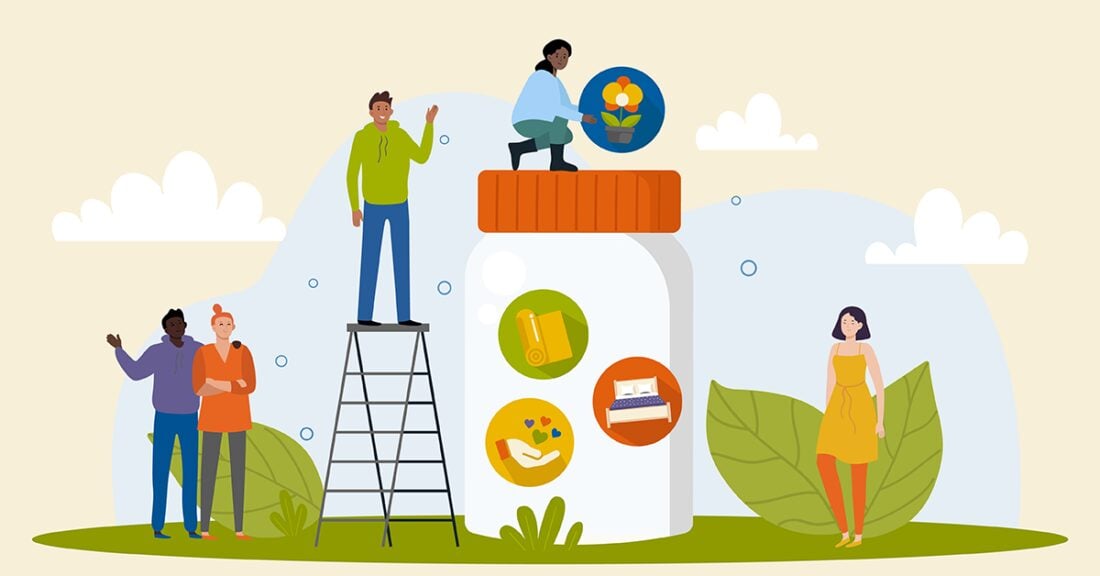Jim Casey Fellows Lead With Wellness and Community to Transform Child Welfare

Twelve Jim Casey Fellows — young leaders and advocates who have experienced foster care — recently completed the Annie E. Casey Foundation’s Advanced Youth Leadership Institute (AYLI), a program of the Jim Casey Youth Opportunities Initiative®. Through AYLI, they’ve deepened the knowledge and skills needed to drive meaningful change in child welfare practice and policies. After completing a series of leadership development seminars, the Fellows applied what they’ve learned by designing and leading projects either in their communities or at the national level.
AYLI teaches participants how to facilitate discussions on meaningful issues, how system change happens through policy and what is necessary to manage their own well-being as advocates. With continued guidance from AYLI facilitators, Fellows design and implement projects aligned with their passions. Most Fellows also engage with Jim Casey Initiative partner sites and other youth-serving agencies across the country to bolster their efforts.
“One of the most powerful contributions of the Jim Casey Initiative over the last 24 years has been the investment in young people and their leadership,” said Catherine Lester, associate director of the Foundation’s Family Well-Being Strategy Group. “Through the Jim Casey Initiative, hundreds of young people have engaged in leadership experiences like AYLI to practice new skills and gain the confidence to creatively address their personal needs and the needs of their community.”
Promoting Wellness, Financial Health and Community
This year, many Fellows chose projects that promote self-care, wellness and community-based support services for their peers.
Jim Casey Fellow Gloria Noelle Ladeene Richardson developed and led a workshop on the importance of rest. She offered the training at Ready for Life, a Florida-based nonprofit organization that supports young people who are transitioning out of foster care. Richardson, who is a program support specialist at Ready for Life, opened the workshop to colleagues and young people.
“I realized I wasn’t letting myself rest. I was just on autopilot,” said Richardson. “What I would tell fellow providers and other young people is that sometimes we have to say, ‘If I can’t help myself, then I can’t help you.’ At the end of the day, we need to put more into ourselves before we give more of ourselves.”
At the conclusion of the workshop, each participant created a “rest jar” filled with a collection of personalized activities to support different kinds of rest. In a moment of stress, overwhelm or exhaustion, participants can extract prompts that offer healthy alternatives in seven categories:
- Physical: sleeping, breathing, stretching
- Mental: taking breaks
- Emotional: setting boundaries
- Sensory: limiting screen time or having quiet time
- Creative: engaging with art or nature
- Social: spending quality time with loved ones
- Spiritual: meditating
In Georgia, Jim Casey Fellow Eshontee Williams created a personal development course to help her peers build self-awareness, reflect on identity and understand how investing in personal growth can lead to stronger, more authentic partnerships. She presented the course to GA EmpowerMEnt advocates — young leaders with the Georgia Jim Casey Initiative site partner the Multi-Agency Alliance for Children.
Two Jim Casey Fellows, Amouree Small and Sharnelle Bennett, worked with state agencies to improve financial wellness for young people in or transitioning from foster care, who often lack opportunities to learn about finances and practice financial decision making. Small worked with the South Carolina Department of Social Services to build and deliver a financial literacy workshop on budgeting and saving. Bennett worked with the Kansas Department for Children and Families to develop and deliver a similar training, equipping young people with tools to manage their finances.
Building Community and Support Networks
As part of the broader Jim Casey Fellowship, young leaders working to create lasting change in the child welfare system are offered spaces to come together, share knowledge and exchange ideas for addressing challenges in their communities.
Drawing on their experiences, some Fellows sought to create spaces where young people could feel supported and have access to vital resources.
Makyla Watson started a support network for University of Southern Mississippi students with foster care experience. Her work benefits recipients of the Faith Scholarship, a program that helps youth who are in or have exited foster care pay for college tuition, fees and room and board. With the support of the Jim Casey Initiative’s Mississippi partner site First Place for Youth, Watson’s support network will include peer mentorship, study groups and club activities that give students the chance to learn about on- and off-campus resources and expand connections and friendships.
“AYLI taught me how passionate my peers are,” said Williams. “It was a big community where we’re trying to take care of each other while taking care of those who are experiencing foster care now.”






